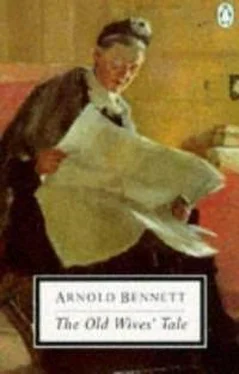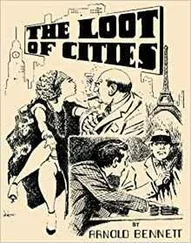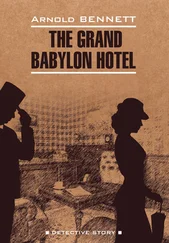Then Maria Critchlow had gone a step further. She had summoned the eldest assistant to her corner and had informed her, with all the solemnity of a confession made to assuage a conscience which has been tortured too long, that she had on many occasions been guilty of sexual irregularity with her late employer, Samuel Povey. There was no truth whatever in this accusation (which everybody, however, took care not to mention to Constance); it merely indicated, perhaps, the secret aspirations of Maria Insull, the virgin. The assistant was properly scandalized, more by the crudity of Mrs. Critchlow's language than by the alleged sin buried in the past. Goodness knows what the assistant would have done! But two hours later Maria Critchlow tried to commit suicide by stabbing herself with a pair of scissors. There was blood in the shop.
With as little delay as possible she had been driven away to the asylum. Charles Critchlow, enveloped safely in the armour of his senile egotism, had shown no emotion, and very little activity. The shop was closed. And as a general draper's it never opened again. That was the end of Baines's. Two assistants found themselves without a livelihood. The small tumble with the great.
Constance's emotion was more than pardonable; it was justified. She could not eat and Lily could not persuade her to eat. In an unhappy moment Dick Povey mentioned--he never could remember how, afterwards--the word Federation! And then Constance, from a passive figure of grief became a menace. She overwhelmed Dick Povey with her anathema of Federation, for Dick was a citizen of Hanbridge, where this detestable movement for Federation had had its birth. All the misfortunes of St. Luke's Square were due to that great, busy, grasping, unscrupulous neighbour. Had not Hanbridge done enough, without wanting to merge all the Five Towns into one town, of which of course itself would be the centre? For Constance, Hanbridge was a borough of unprincipled adventurers, bent on ruining the ancient 'Mother of the Five Towns' for its own glory and aggrandizement. Let Constance hear no more of Federation! Her poor sister Sophia had been dead against Federation, and she had been quite right! All really respectable people were against it! The attempted suicide of Mrs. Critchlow sealed the fate of Federation and damned it for ever, in Constance's mind. Her hatred of the idea of it was intensified into violent animosity; insomuch that in the result she died a martyr to the cause of Bursley's municipal independence.
III
It was on a muddy day in October that the first great battle for and against Federation was fought in Bursley. Constance was suffering severely from sciatica. She was also suffering from disgust with the modern world.
Unimaginable things had happened in the Square. For Constance, the reputation of the Square was eternally ruined. Charles Critchlow, by that strange good fortune which always put him in the right when fairly he ought to have been in the wrong, had let the Baines shop and his own shop and house to the Midland Clothiers Company, which was establishing branches throughout Staffordshire, Warwickshire, Leicestershire, and adjacent counties. He had sold his own chemist's stock and gone to live in a little house at the bottom of Kingstreet. It is doubtful whether he would have consented to retire had not Alderman Holl died earlier in the year, thus ending a long rivalry between the old men for the patriarchate of the Square. Charles Critchlow was as free from sentiment as any man, but no man is quite free from it, and the ancient was in a position to indulge sentiment had he chosen. His business was not a source of loss, and he could still trust his skinny hands and peering eyes to make up a prescription. However, the offer of the Midland Clothiers Company tempted him, and as the undisputed 'father' of the Square he left the Square in triumph.
The Midland Clothiers Company had no sense of the proprieties of trade. Their sole idea was to sell goods. Having possessed themselves of one of the finest sites in a town which, after all was said and done, comprised nearly forty thousand inhabitants, they set about to make the best of that site. They threw the two shops into one, and they caused to be constructed a sign compared to which the spacious old 'Baines' sign was a postcard. They covered the entire frontage with posters of a theatrical description--coloured posters! They occupied the front page of the Signal, and from that pulpit they announced that winter was approaching, and that they meant to sell ten thousand overcoats at their new shop in Bursley at the price of twelve and sixpence each. The tailoring of the world was loudly and coarsely defied to equal the value of those overcoats. On the day of opening they arranged an orchestra or artillery of phonographs upon the leads over the window of that part of the shop which had been Mr. Critchlow's. They also carpeted the Square with handbills, and flew flags from their upper storeys. The immense shop proved to be full of overcoats; overcoats were shown in all the three great windows; in one window an overcoat was disposed as a receptacle for water, to prove that the Midland twelve-and-sixpenny overcoats were impermeable by rain. Overcoats flapped in the two doorways. These devices woke and drew the town, and the town found itself received by bustling male assistants very energetic and rapid, instead of by demure anaemic virgins. At moments towards evening the shop was populous with custom; the number of overcoats sold was prodigious. On another day the Midland sold trousers in a like manner, but without the phonographs. Unmistakably the Midland had shaken the Square and demonstrated that commerce was still possible to fearless enterprise.
Nevertheless the Square was not pleased. The Square was conscious of shame, of dignity departed. Constance was divided between pain and scornful wrath. For her, what the Midland had done was to desecrate a shrine. She hated those flags, and those flaring, staring posters on the honest old brick walls, and the enormous gilded sign, and the windows all filled with a monotonous repetition of the same article, and the bustling assistants. As for the phonographs, she regarded them as a grave insult; they had been within twenty feet of her drawing-room window! Twelve-and- sixpenny overcoats! It was monstrous, and equally monstrous was the gullibility of the people. How could an overcoat at twelve and sixpence be 'good.' She remembered the overcoats made and sold in the shop in the time of her father and her husband, overcoats of which the inconvenience was that they would not wear out! The Midland, for Constance, was not a trading concern, but something between a cheap-jack and a circus. She could scarcely bear to walk down the Square, to such a degree did the ignoble frontage of the Midland offend her eye and outrage her ancestral pride. She even said that she would give up her house.
But when, on the twenty-ninth of September, she received six months' notice, signed in Critchlow's shaky hand, to quit the house--it was wanted for the Midland's manager, the Midland having taken the premises on condition that they might eject Constance if they chose--the blow was an exceedingly severe one. She had sworn to go--but to be turned out, to be turned out of the house of her birth and out of her father's home, that was different! Her pride, injured as it was, had a great deal to support. It became necessary for her to recollect that she was a Baines. She affected magnificently not to care. But she could not refrain from telling all her acquaintances that she was being turned out of her house, and asking them what they thought of THAT; and when she met Charles Critchlow in the street she seared him with the heat of her resentment. The enterprise of finding a new house and moving into it loomed before her gigantic, terrible, the idea of it was alone sufficient to make her ill.
Читать дальше











